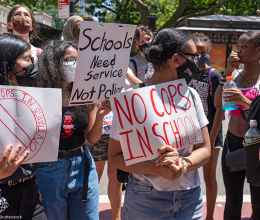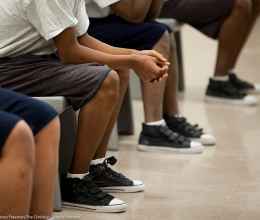
We cannot treat our students as criminal suspects.
Students have a right to feel safe and respected at school.
- School climate is a main indicator of school violence.
Law enforcement must focus on protection, not discipline
- School resource officers’ primary role must be to protect the school from safety threats.
- Using law enforcement as disciplinarians erodes the school climate and shifts too many students into the school-to-prison pipeline.
- More than 1,000 arrests are made at schools each year for disorderly conduct – more than are made each year in the community. How many of those could be resolved without the police?
Police presence disproportionately harms students of color
- All students deserve to feel safe at school.
- Black students in Florida are two and a half times as likely to be expelled, more than three times as likely to be arrested and twice as likely to be charged as adults.
Schools need resources, not policing.
- The legislature increased the base per student spending by 47 cents this year.
- Florida has the third largest school enrollment yet ranks 42nd in per student spending and 35th in teacher salaries.
- We rank 50th in per capita spending for all education, and 26th in per capita spending on corrections.
Students need education, not arrests
- Adolescence is the age when we develop our ability to reason logically, plan ahead and control our emotions. Students need guidance on developing these executive skills.
- Youth are most often arrested at school for fighting. Restorative justice programs that bring people together and teach empathy and responsibility are more effective than arrests to resolve the underlying issues behind these fights and give students the skills they need to mediate future disputes.
- The deeper a youth goes into the juvenile justice system, the more likely he or she is to reoffend. Nearly half of all youth who end up committed to juvenile justice residential programs reoffend within a year. Youth are four times as likely to reoffend if they are referred to a diversion program after an arrest than if they are referred without arrest.
Prevent school violence, don’t perpetuate it
- Students have a right to safe, accepting schools that challenge them to excel.
- The majority of mental illnesses first emerge during adolescence, and are the most effectively treated during this period, yet the state’s school-to-counselor ration is nearly double the recommended 1:250.
- Invest in prevention programming, such as comprehensive mental health services that identify emerging mental illnesses and support social-emotional learning.






